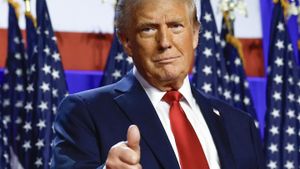With Donald Trump making headlines again, his trade policies are back at the forefront of discussions among global leaders and economists alike. The former president has hinted at reintroducing tariffs, which has sparked concerns about the potential for renewed trade conflicts. Observers are particularly interested in how this might affect not only the U.S. economy but also its relationships with trading partners such as the European Union and Mexico.
Trade experts are already analyzing the ramifications of Trump's approach, which could lead to heightened tensions reminiscent of the trade wars from his first term. John Alty, senior trade adviser to Pagefield and former trade official to the UK government, shares insights about these impending challenges, especially concerning the UK’s position outside the EU. "Having maintained balanced trade with the U.S., the UK might not bear the brunt of harm if tariffs are re-enacted," he explains.
Last year, trade dynamics heavily favored the EU, which exported around €27 billion worth of food and drink to the U.S., marking a 19% increase from the previous year. That puts Europe at risk as Trump explores options to impose tariffs across the board. But with the UK’s exports to the U.S. hitting £2.4 billion in 2022, there is potential for the UK to navigate these waters more adeptly than its former EU partners.
Meanwhile, south of the border, Mexico is preparing to react strongly to Trump's latest threats. Marcelo Ebrard, Mexico’s Secretary of Economy, hinted they might impose retaliatory tariffs if Trump follows through on his proposition of 25% tariffs on Mexican goods. “If you put 25 percent tariffs on me, I have to react with tariffs,” Ebrard stated, emphasizing Mexico's readiness to counteract any punitive measures.
This back-and-forth reflects the broader fears of reviving trade wars akin to those seen during Trump’s first term. During then, tariffs on Chinese imports led to retaliatory measures from the Asian giant and the U.S.'s neighboring countries, such as Mexico and Canada, which sparked economic turmoil. Now, the stakes are again high, with members of the business community and political leaders concerned about the potential fallout from renewed trade hostilities.
One prominent figure urging caution is Valeria Moy, the general director of the Mexican Institute for Competitiveness. She states, “A tariff war doesn’t end well.” Moy argues it would negatively impact both economies. During Trump’s prior administration, tariffs spurred price increases on consumer goods, creating unnecessary strain on American households.
Sheinbaum, Mexico's President, hasn’t echoed Ebrard's hawkish tone. Instead, she has voiced her administration's eagerness to negotiate with Trump’s team, even before he officially takes office. “It is important to get in touch, to know what they are thinking and to move forward in coordination as much as possible," she remarked.
For leaders within the EU, the urgency to prepare for potential Trump tariffs cannot be understated. Countries are bracing themselves for possible retaliatory actions from the bloc, which has already indicated it would not sit idly by. Negotiations are expected to be tense as both sides work to balance political and economic priorities amid fluctuated trade relationships.
Notably, if Trump expands tariffs beyond the proposed 25% on Mexico, he might reach as high as 100%. Such drastic measures could cripple cross-border trade, as close to 80% of Mexico’s exports are sent to the U.S. Simultaneously, American industries banking on exports to Mexico for their survival could face dire consequences.
Officials both sides are wary of history repeating itself. The once volatile relationship between the U.S. and China demonstrates the unpredictability of such trade wars. Under Trump's initial administration, tariffs implemented to shift trade dynamics often led to imitative tariffs from affected countries, creating viable economic hurdles for both American companies and consumers.
Returning to the UK, commentators are assessing the impact of being outside the EU as the dynamics shift. Alty believes smaller countries like the UK might have more flexibility to negotiate favorable trade agreements as the EU faces broader tariffs. Recognizing the unique position, Alty feels optimism amid the uncertainty. “To some extent, the UK isn't at the top of Trump's target list, considering the balance we maintain,” he notes.
Nevertheless, all these dynamics culminate with the potential for price hikes. The recurring criticism is based on the premise of tariffs not being absorbed by foreign economies but rather pushed back onto American consumers. An increase in tariffs could lead to elevated prices for everyday goods, raising the stakes for families already struggling with inflation.
With negotiations looming and trade discussions heating up, the coming months will be pivotal for global trade, diplomacy, and economic health on all sides of the border. Understanding the intersection between political maneuvers and economic consequences will be necessary for all stakeholders involved.
Perhaps the most ominous sentiment voiced by critics is the unsettling familiarity with protectionist policies aligning too closely with the instability of historical trade conflicts, stirring anxiety about where these policies could lead again.
So, as the world watches Trump's moves closely, hopes for constructive dialogue remain high. Will Trump’s next administration spark another trade war, or will leaders choose diplomacy and cooperation to avoid the pitfalls of the past? Only time will tell, but the world is holding its breath.



